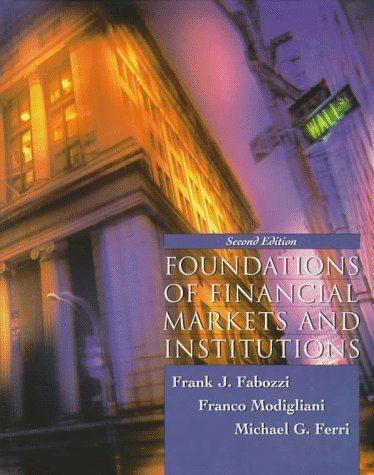Answered step by step
Verified Expert Solution
Question
1 Approved Answer
Manual procedure and no excel PROBLEM TWO (5 marks) Billy Gates is 17 years old and wonders whether a degree from Harvard is really going

Manual procedure and no excel
PROBLEM TWO (5 marks) Billy Gates is 17 years old and wonders whether a degree from Harvard is really going to be worth it. He has planned to begin his studies in January 2023 (he took off the first semester of 2022/2023 to back-pack through Europe) and anticipates that it will take him seven years to earn a doctorate in computer engineering. He is evaluating the following two alternatives: Option 1 University will cost $40,000 a year. He and his parents have already set his tuition aside for him in a savings account. He will earn $100,000 one year after he graduates. This salary is expected to grow at a constant rate of 5% per year until he retires. Option 2 On the other hand, he could take the money that he and his parents have saved for his tuition, (i.e., the present value of his tuition) and invest it in his own all-equity financed corporation. Billy has determined that by the end of 7 years from now his firm will begin to pay an annual dividend. The first dividend will be $5. Subsequently, he anticipates that the dividends will grow annually at a rate g forever. If Billy decides to start his own company, he will own 5 thousand shares of stock at any one time. Assume that as a shareholder in the firm, he earns no income other than dividend income. No matter which option he selects he plans to retire in 20 years from January 2043. (i.e., 13 years after he graduates). If the risk-adjusted required rate of return for the firm will be 15%, what is the minimum rate of growth of dividends, g (to the nearest percent) that will convince Billy to forgo university. PROBLEM TWO (5 marks) Billy Gates is 17 years old and wonders whether a degree from Harvard is really going to be worth it. He has planned to begin his studies in January 2023 (he took off the first semester of 2022/2023 to back-pack through Europe) and anticipates that it will take him seven years to earn a doctorate in computer engineering. He is evaluating the following two alternatives: Option 1 University will cost $40,000 a year. He and his parents have already set his tuition aside for him in a savings account. He will earn $100,000 one year after he graduates. This salary is expected to grow at a constant rate of 5% per year until he retires. Option 2 On the other hand, he could take the money that he and his parents have saved for his tuition, (i.e., the present value of his tuition) and invest it in his own all-equity financed corporation. Billy has determined that by the end of 7 years from now his firm will begin to pay an annual dividend. The first dividend will be $5. Subsequently, he anticipates that the dividends will grow annually at a rate g forever. If Billy decides to start his own company, he will own 5 thousand shares of stock at any one time. Assume that as a shareholder in the firm, he earns no income other than dividend income. No matter which option he selects he plans to retire in 20 years from January 2043. (i.e., 13 years after he graduates). If the risk-adjusted required rate of return for the firm will be 15%, what is the minimum rate of growth of dividends, g (to the nearest percent) that will convince Billy to forgo universityStep by Step Solution
There are 3 Steps involved in it
Step: 1

Get Instant Access to Expert-Tailored Solutions
See step-by-step solutions with expert insights and AI powered tools for academic success
Step: 2

Step: 3

Ace Your Homework with AI
Get the answers you need in no time with our AI-driven, step-by-step assistance
Get Started


